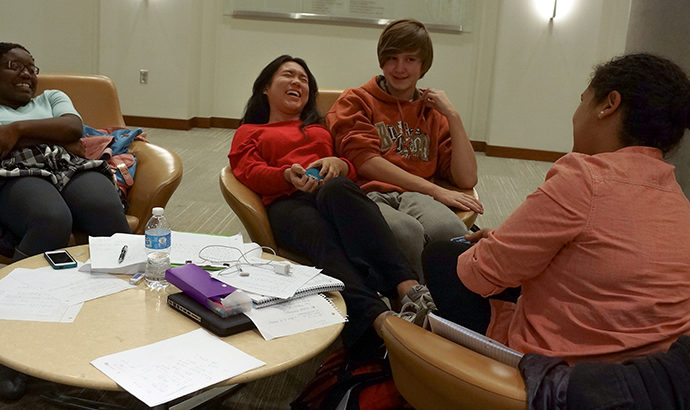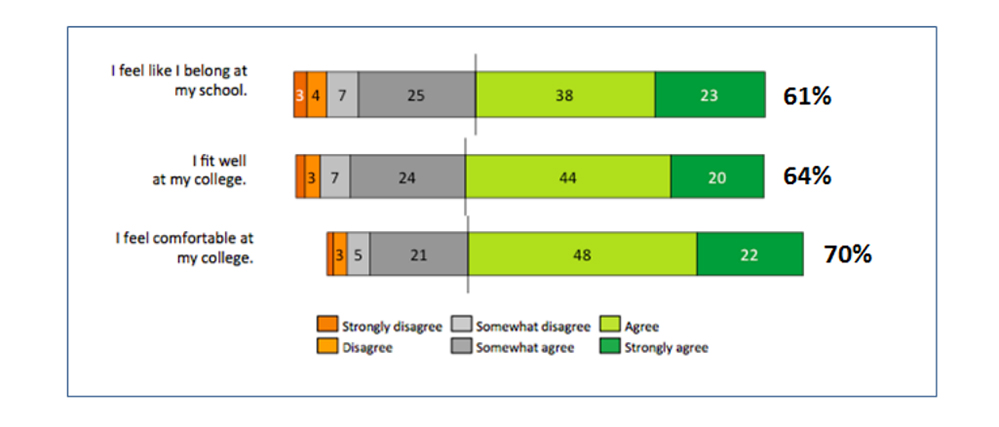Most KIPP Grads Report a Sense Of Belonging and Engagement In College, New Report Finds
ByKate Stringer
Read the full article at The74Million.org>
Updated
Most students who graduate from the KIPP charter school network feel a sense of belonging once they get to college, according to a survey released today. However, the majority also feel judged based on their race or socioeconomic background.
Of the 3,000 students surveyed by the network, 61 percent said they felt like they belong at their school, 70 percent felt comfortable, and 59 percent reported good mental health. The survey found a correlation between having a sense of belonging, good grades and good mental health.
But 58 percent of students still worried about being judged for their race and 56 percent for their social class. KIPP alumni who attended historically black colleges and universities found a greater sense of belonging than their peers who did not, with 72 percent feeling like they belonged (versus 61 percent of students at other colleges), 66 percent reporting better mental health (versus 58 percent), and 72 percent reporting that they met at least twice with a mentor (versus 56 percent).
The findings underscore the national struggle to boost the college graduation rate for low-income students and students of color, who lag behind their wealthier, white peers. This is an important mission for KIPP, where 95 percent of its nearly 90,000 students nationwide are African American or Latino and 90 percent are low-income. Currently, 11,000 KIPP alumni are enrolled in college. (KIPP considers alumni those students who graduated from KIPP a middle school or high school.)
The four-year college completion rate for young people from low-income families is 9 percent. But at KIPP, which more rigorously tracks its students from the beginning of 9th grade, the college graduation rate is 38 percent — more than four times the national average.
“Even though you can look at the survey and see kids who are struggling, I know our KIPP students to be amazingly resilient,” said Tevera Stith, director of the KIPP Through College program for KIPP DC. “When you look at the number of students from similar backgrounds and places that are navigating college, our matriculation rates are tremendous.”
The program follows KIPP graduates as they pursue higher education, providing counselors who advise between 150 and 175 college students apiece. They serve as a sort of external lifeline by texting, calling, and emailing with the students around critical points like midterms and finals, as well as visiting to see how each has adjusted to campus. The program also plans to connect students with alumni on campus, encourage them to participate in school programs, and identify how their purpose aligns with their major.
Conducting the survey was important because some KIPP graduates who had dropped out of college reported that they didn’t feel they belonged, Stith said.
The survey found it’s difficult for students to feel like their sense of belonging is something they themselves can help change. While 85 percent agreed that they could grow their intelligence, only 59 percent agreed they could change their sense of belonging.
This finding is common in other research, where students said they seek out historically black colleges and universities specifically for a sense of belonging and cultural engagement.
“There’s an overarching cultural ethos that permeates these campuses for African-American students,” said Brian Bridges, vice president of research and member engagement at UNCF, which supports these colleges. The schools “are dedicated to communities and social justice and leadership development and students who choose to attend them have values that align strongly with those focus areas.”
At KIPP, the journey to help students feel included in college starts before they graduate high school. In January, seniors can be found learning how to make budgets for school supplies and food, how to get along with future roommates, or what to do when confronted with microaggressions as minorities on predominantly white college campuses.
Cordelia Elaiho attended KIPP Academy in the Bronx for middle school and remembers several advisers working with her during her time at Vassar College, where she graduated in 2012. She said they visited campus, called and emailed her to check in, and provided a book stipend to help with supplies.
“I don’t think I utilized my (KIPP) adviser as much as other people, but it was important to know that other people cared about me,” Elaiho said. “I found people on campus that cared, but (KIPP) people knew me since I was 10 or 11 years old and they could give me a connection to home.”
The survey was sent via email to KIPP alumni in college, and 3,000 responded from around the country (though not all answered every question). The survey measures were developed by the College Transition Collaborative.
Disclosure: Walton Family Foundation, The Eli and Edythe Broad Foundation, the Bill & Melinda Gates Foundation, and the Carnegie Corporation of New York provide financial support to KIPP and The 74.

